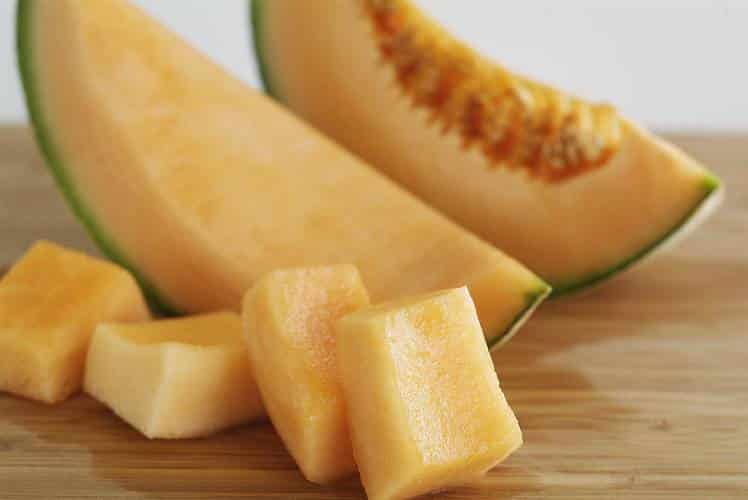Cantaloupe is appreciated for its characteristic aroma and flavor that is different from the other melons. Its pulp is rich in beta-carotene (provitamin A), which accounts for its vibrant orange color.
Disease/Ailment:
Chronic inflammation
Elevated cholesterol
Urinary conditions
Health benefits:
Urinary conditions: Melon consumption enriches the blood with mineral salts and vitamins that facilitates the filtering capacity of the kidneys.
Anti-inflammatory: The antioxidant compounds in cantaloupe lowers the C-reactive protein levels, which is a biomarker for indicating inflammation.
Antioxidant: Cantaloupe is packed with beta-carotene (provitamin A) and ascorbic acid (vitamin C), which are two powerful antioxidants that reduce the oxidative stress that can cause cardiovascular disease, hypertension, chronic inflammation, and diabetes.
Good source of:
Vitamin A, C, potassium
Purchasing, storing, and enjoying:
Purchasing: Due to its high susceptibility to Salmonella and Listeria, avoid purchasing pre-cut cantaloupe. There are a number of different ways to test for ripeness. Pick melons that are heavy for its size. The outer rind should be cream, yellow, or golden, not green or gray. If you gently press on the top of a ripe cantaloupe, you should feel it give way very slightly. If the spot gives away substantially and the melon feels soft, this indicates overripeness. Another indicator of ripeness is smelling the bottom of the cantaloupe. While unripe melons will have little to no smell, ripe cantaloupes will have a sweet aroma. Peak season for cantaloupe is June-September.
Storing: If purchasing an unripe cantaloupe, leave the melon at room temperature for a few days to allow for ripening. If the cantaloupe is already ripe, store in the refrigerator for up to four days.
Enjoying: Before cutting into cantaloupe, make sure to always wash the outside of the melon. After cutting the melon in half, scoop out and discard the seeds that are in the middle.
- Start your morning with fresh-cut cantaloupe. Cantaloupe is 90% water leaving you well hydrated and satisfied. Seeds are edible but are usually disposed.
- Try grilling slices of cantaloupe at your next outdoor barbeque. Believe me, you won't regret it.
Caution: Cantaloupe has been linked to many cases of Salmonella and Listeria outbreaks. Always wash melons thoroughly before consuming. Vulnerable populations such as pregnant women, babies, and elderly should avoid consuming cantaloupe to reduce risk.
References:
de Melo, MLS, Narain N and Bora PS. Characterisation of some nutritional constituents of melon (Cucumis melo hybrid AF-522) seeds. Food Chemistry, Volume 68, Issue 4, March 2000, Pages 411-414.
Ismail HI, Chan KW, Mariod AA et al. Phenolic content and antioxidant activity of cantaloupe (cucumis melo) methanolic extracts. Food Chemistry, Volume 119, Issue 2, 15 March 2010, Pages 643-647.
Naito Y, Akagiri S, Uchiyama K et al. Reduction of diabetes-induced renal oxidative stress by a cantaloupe melon extract/gliadin biopolymers, oxykine, in mice. Biofactors. 2005;23(2):85-95.
http://www.whfoods.com/genpage.php?tname=foodspice&dbid=17
“Kentucky: Cabinet for Health and Family Services – Salmonella2012” (HTML). Retrieved 2012-Aug-18. “In general, the FDA recommends thoroughly washing and scrubbing the rinds of all cantaloupes and melons prior to cutting and slicing, and to keep sliced melons refrigerated prior to eating.”

